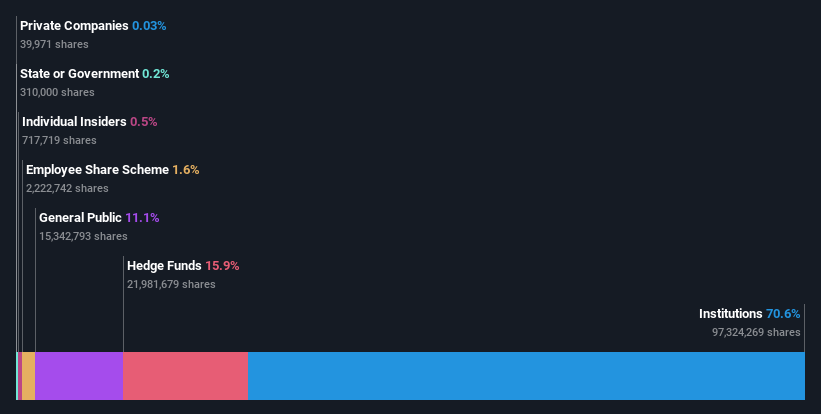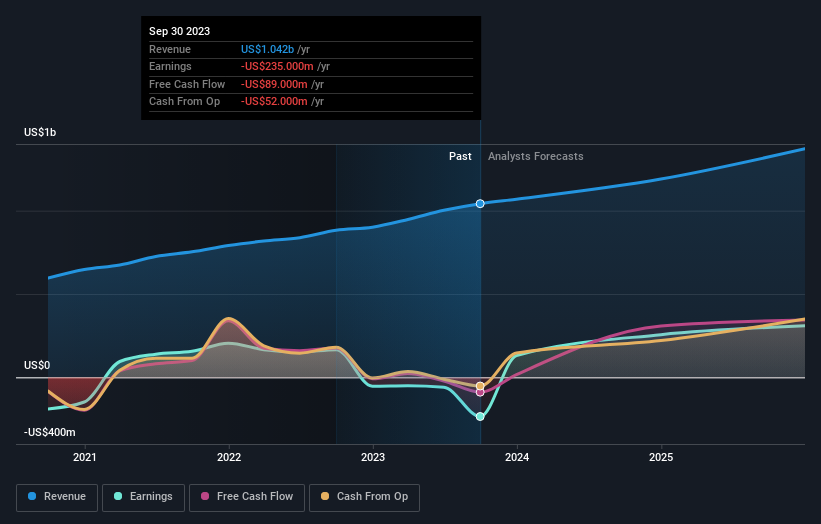Great week for Indivior PLC (LON:INDV) institutional investors after losing 22% over the previous year
Key Insights
Given the large stake in the stock by institutions, Indivior's stock price might be vulnerable to their trading decisions
A total of 16 investors have a majority stake in the company with 51% ownership
Using data from analyst forecasts alongside ownership research, one can better assess the future performance of a company
Every investor in Indivior PLC (LON:INDV) should be aware of the most powerful shareholder groups. The group holding the most number of shares in the company, around 71% to be precise, is institutions. Put another way, the group faces the maximum upside potential (or downside risk).
Institutional investors would probably welcome last week's 5.6% increase in share prices after a year of 22% losses as a sign that returns are likely to begin trending higher.
Let's take a closer look to see what the different types of shareholders can tell us about Indivior.
See our latest analysis for Indivior
What Does The Institutional Ownership Tell Us About Indivior?
Institutional investors commonly compare their own returns to the returns of a commonly followed index. So they generally do consider buying larger companies that are included in the relevant benchmark index.
Indivior already has institutions on the share registry. Indeed, they own a respectable stake in the company. This suggests some credibility amongst professional investors. But we can't rely on that fact alone since institutions make bad investments sometimes, just like everyone does. If multiple institutions change their view on a stock at the same time, you could see the share price drop fast. It's therefore worth looking at Indivior's earnings history below. Of course, the future is what really matters.
Since institutional investors own more than half the issued stock, the board will likely have to pay attention to their preferences. It looks like hedge funds own 16% of Indivior shares. That's interesting, because hedge funds can be quite active and activist. Many look for medium term catalysts that will drive the share price higher. Two Seas Capital LP is currently the largest shareholder, with 9.9% of shares outstanding. For context, the second largest shareholder holds about 6.0% of the shares outstanding, followed by an ownership of 4.7% by the third-largest shareholder.
A closer look at our ownership figures suggests that the top 16 shareholders have a combined ownership of 51% implying that no single shareholder has a majority.
While studying institutional ownership for a company can add value to your research, it is also a good practice to research analyst recommendations to get a deeper understand of a stock's expected performance. Quite a few analysts cover the stock, so you could look into forecast growth quite easily.
Insider Ownership Of Indivior
The definition of company insiders can be subjective and does vary between jurisdictions. Our data reflects individual insiders, capturing board members at the very least. Management ultimately answers to the board. However, it is not uncommon for managers to be executive board members, especially if they are a founder or the CEO.
Most consider insider ownership a positive because it can indicate the board is well aligned with other shareholders. However, on some occasions too much power is concentrated within this group.
Our most recent data indicates that insiders own less than 1% of Indivior PLC. It is a pretty big company, so it would be possible for board members to own a meaningful interest in the company, without owning much of a proportional interest. In this case, they own around UK£9.5m worth of shares (at current prices). Arguably, recent buying and selling is just as important to consider. You can click here to see if insiders have been buying or selling.
General Public Ownership
The general public, who are usually individual investors, hold a 11% stake in Indivior. While this size of ownership may not be enough to sway a policy decision in their favour, they can still make a collective impact on company policies.
Next Steps:
I find it very interesting to look at who exactly owns a company. But to truly gain insight, we need to consider other information, too. To that end, you should learn about the 2 warning signs we've spotted with Indivior (including 1 which makes us a bit uncomfortable) .
If you are like me, you may want to think about whether this company will grow or shrink. Luckily, you can check this free report showing analyst forecasts for its future.
NB: Figures in this article are calculated using data from the last twelve months, which refer to the 12-month period ending on the last date of the month the financial statement is dated. This may not be consistent with full year annual report figures.
Have feedback on this article? Concerned about the content? Get in touch with us directly. Alternatively, email editorial-team (at) simplywallst.com.
This article by Simply Wall St is general in nature. We provide commentary based on historical data and analyst forecasts only using an unbiased methodology and our articles are not intended to be financial advice. It does not constitute a recommendation to buy or sell any stock, and does not take account of your objectives, or your financial situation. We aim to bring you long-term focused analysis driven by fundamental data. Note that our analysis may not factor in the latest price-sensitive company announcements or qualitative material. Simply Wall St has no position in any stocks mentioned.


